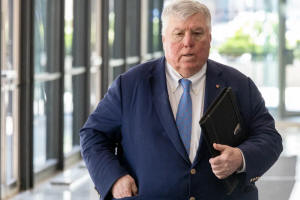Longtime ComEd lobbyist gets 1 year in prison for role in Madigan
bribery scheme
[August 06, 2025]
By Hannah Meisel
CHICAGO — Longtime Chicago lobbyist Jay Doherty was sentenced Tuesday to
a year and a day in prison for his role in a yearslong bribery scheme
between his biggest client, electric utility Commonwealth Edison, and
former Illinois House Speaker Michael Madigan.
For eight years, Doherty agreed to use his consulting company as a
pass-through in order to pay several political allies of Madigan’s, who
did nothing for ComEd but received monthly checks ranging from $4,000 to
$5,000. Two separate juries have found the payments were the cornerstone
of a larger bribery scheme aimed at influencing Madigan while the
utility pushed for major legislation in Springfield.
Before U.S. District Judge Manish Shah handed down his sentence Tuesday
morning, Doherty told the judge he was “deeply ashamed” that he hadn’t
recognized how far he’d strayed from the values of public service that
led him to a career in government affairs. Doherty had spent decades
heading up the influential City Club of Chicago and said he prided
himself on connecting people, though acknowledged that some might call
it “gladhanding.”
“Sometime over the years, instead of seeing my job as a means of
service, it became simply a way to make more money and to build myself
up,” Doherty said as he addressed Shah from a lectern in front of the
courtroom. “To gain and not give. … My focus centered on how I could be
the big man on campus and make money.”
Doherty’s contract swelled with each new Madigan-allied subcontractor,
including monthly boosts of $1,000 to $1,500 three of the four times a
man was added, which totaled roughly $220,000 in extra payments from
2011 to 2016.

The former lobbyist is the final of the “ComEd Four” to be sentenced
after a series of hearings last month. Shah on Tuesday said Doherty was
the least culpable of the group, but said his crimes were still serious
enough to warrant incarceration.
“Behind the scenes, you played a criminal game that undermines all that
the soft power that persuasion, organization and debate is meant to
achieve, how civic, lawful democracy is supposed to work.” the judge
said. “You cheated the very thing you put a face to at the City Club of
Chicago.”
The ComEd Four were convicted in 2023 after a six-week trial featuring
hundreds of wiretapped phone calls and several secretly recorded videos.
In one of those tapes, ComEd executive-turned-FBI mole Fidel Marquez
asked Doherty what the subcontractors were doing for him.
“Not much,” Doherty answered, adding that he rarely even spoke with the
subcontractors but “they keep their mouth shut.”
Later in the meeting, Doherty told Marquez that it’s “worth it” to “keep
Mike Madigan happy.”
“No. 1: Your money comes from Springfield,” Doherty said of ComEd,
referring to the state’s regulatory process for approving utility rates.
“… My bottom line advice would be, if it ain’t broke, don’t fix it with
those guys.”
Sentencings for Doherty and his co-defendants were put on hold for more
than two years, delayed by concerns of possible impact from a U.S.
Supreme Court ruling, the death of the original judge who oversaw their
case, and Madigan’s own lengthy trial. The former speaker was convicted
on 10 corruption charges in February and sentenced to 7 ½ years in
prison earlier this summer.
[to top of second column]
|

Former Commonwealth Edison lobbyist and City Club of Chicago
director Jay Doherty leaves the Dirksen Federal Courthouse on Aug.
5, 2025. (Capitol News Illinois photo by Andrew Adams)

The ComEd Four received across-the-board guilty verdicts after their
2023 trial, but Shah earlier this year tossed the convictions on most of
the bribery counts, only leaving in place an overarching conspiracy
charge. Their sentences are based on that count, as well as charges
involving having falsified ComEd’s books and records in the
co-conspirators’ efforts to further the bribery scheme.
Prosecutors won’t pursue a retrial on the bribery charges as Shah has
granted dismissal of those counts after each sentencing, though the
judge has told each defendant that he still believed they’d engaged in
bribery.
Doherty’s attorney Gabrielle Sansonetti told Shah on Tuesday that her
client’s “desire to go to trial” isn’t a deficiency of his character,
but rather a “lack of clarity” on what defines bribery in federal
statute.
“He fought because the law is unclear, not because he’s thumbing his
nose at the law,” she said. “But he stands here today remorseful,
nonetheless.”
Both Madigan and Doherty’s co-defendant, former ComEd CEO Anne
Pramaggiore, have already filed appeals in their related cases and plan
to use ambiguity in federal bribery law as the basis for their
arguments.
Pramaggiore received a two-year sentence last month, as did longtime
Springfield lobbyist Mike McClain, who spent decades as Madigan’s close
friend and advisor. Former ComEd executive John Hooker received 18
months in prison.
Assistant U.S. Attorney Sarah Streicker, who also helped prosecute
Madigan’s case, had argued for a 15-month sentence, which was
significantly lower than the recommendations the government had made for
the others before Shah handed down the other sentences last month. She
said Doherty showed a willingness to “abuse” his contract with ComEd and
position of trust at the “peak of his career as a lobbyist.”
The judge agreed with the government’s arguments that probation would
not be enough to accomplish deterrence for others who may want to
influence lawmakers to pass public policy in Springfield.

“Once people think government and public policy is a game, is a sport,
they forget that the rules, the law, exist for a larger reason,” Shah
said. “The law’s not just something to work around to score points in a
game.”
Doherty is scheduled to report to prison on Sept. 30. The judge said he
did not impose a fine as Doherty has a “negative net worth” and would be
unable to pay.
Capitol News Illinois is
a nonprofit, nonpartisan news service that distributes state government
coverage to hundreds of news outlets statewide. It is funded primarily
by the Illinois Press Foundation and the Robert R. McCormick Foundation. |